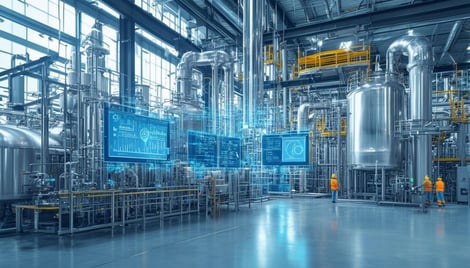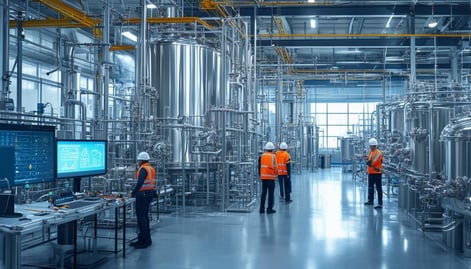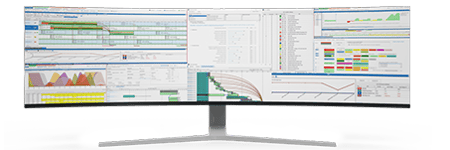Topics: Predictive maintenance, PlanetTogether Software, Integrating PlanetTogether, Enhanced Productivity, Scenario Planning, Unified Data Ecosystem, dynamic collaboration, Chemical Manufacturing, Improved KPI Tracking

Operations directors must balance an array of challenges, from market volatility and environmental regulations to complex production schedules and asset management. In this dynamic environment, the intelligent allocation of production assets stands out as a cornerstone for success.
By integrating advanced solutions like PlanetTogether with enterprise platforms such as SAP, Oracle, Microsoft Dynamics, Kinaxis, or Aveva, chemical manufacturers can revolutionize their production planning and asset management processes. This integration fosters enhanced visibility, streamlined workflows, and data-driven decision-making, paving the way for operational excellence.

Chemical manufacturing involves high stakes and complexity. Production assets—reactors, mixers, pipelines, and storage tanks—must operate at optimal capacity to meet demanding schedules while adhering to safety and environmental regulations. Common challenges include:
Volatile Demand: Chemical products are subject to fluctuations in global demand, making it difficult to plan production and allocate resources effectively.
Resource Constraints: Limited availability of specialized equipment or raw materials can lead to production delays or cost overruns.
Regulatory Compliance: Strict environmental and safety standards require careful planning and monitoring of asset utilization.
Interdependent Processes: The interconnected nature of chemical manufacturing processes amplifies the risk of bottlenecks and inefficiencies.
Data Silos: Disparate systems and fragmented data hinder comprehensive visibility into asset performance and production schedules.
To overcome these challenges, operations directors need a solution that integrates disparate data sources, aligns production schedules, and ensures assets are utilized efficiently and intelligently.

The intelligent allocation of production assets involves leveraging technology and data to assign resources in a way that maximizes efficiency, minimizes waste, and ensures on-time delivery. This requires three key capabilities:
Real-Time Visibility: Understanding the status and performance of all production assets in real time is critical for making informed decisions.
Predictive Analytics: Anticipating equipment failures, maintenance needs, or demand shifts enables proactive adjustments to production schedules.
Seamless Integration: Connecting planning and execution systems ensures data consistency and enables synchronized workflows across the organization.
Here’s how integrating PlanetTogether with platforms like SAP, Oracle, Microsoft Dynamics, Kinaxis, or Aveva can enable these capabilities.
![]()

PlanetTogether is a robust Advanced Planning and Scheduling (APS) system designed to streamline production planning and optimize resource allocation. When integrated with an ERP or SCM system such as SAP, Oracle, Microsoft Dynamics, Kinaxis, or Aveva, PlanetTogether unlocks a host of benefits:
Unified Data Ecosystem
Integration consolidates data from multiple sources, including production schedules, inventory levels, and equipment status.
This unified view eliminates silos, enabling better coordination between production planning, procurement, and maintenance teams.
Dynamic Scheduling
PlanetTogether’s advanced algorithms adapt production schedules in real time based on changing conditions, such as equipment availability or raw material delays.
Integration with SAP or Oracle ensures that these adjustments are automatically reflected in financial and supply chain planning systems.
Predictive Maintenance
By linking asset performance data from Aveva or Microsoft Dynamics with PlanetTogether, manufacturers can anticipate maintenance needs and schedule downtime strategically.
This minimizes unplanned outages and maximizes asset uptime.
Scenario Planning
With integrated systems, operations directors can model different scenarios, such as demand surges or supply chain disruptions, and assess their impact on asset utilization.
This capability enables proactive decision-making and reduces risk.
Improved KPI Tracking
Integration enhances the tracking of key performance indicators (KPIs) such as Overall Equipment Effectiveness (OEE) and production efficiency.
Real-time dashboards provide actionable insights, helping operations directors make informed decisions.

The integration of AI and machine learning technologies further enhances the capabilities of PlanetTogether and ERP/SCM systems. AI-driven analytics can identify patterns and insights that might not be apparent through manual analysis. For example:
Demand Forecasting: AI models analyze historical data and market trends to predict demand, enabling better planning of asset allocation.
Anomaly Detection: Machine learning algorithms detect anomalies in equipment performance, providing early warnings of potential failures.
Optimization Algorithms: Advanced optimization algorithms determine the most efficient allocation of assets, considering multiple variables such as cost, time, and capacity.
In chemical manufacturing, the intelligent allocation of production assets is more than a best practice—it’s a strategic imperative. By integrating advanced planning systems like PlanetTogether with enterprise platforms such as SAP, Oracle, Microsoft Dynamics, Kinaxis, or Aveva, operations directors can achieve unparalleled efficiency, agility, and sustainability.
The journey to intelligent asset allocation requires a commitment to leveraging technology and data to their fullest potential. For chemical manufacturers ready to take this step, the rewards include not only operational excellence but also a stronger position in an increasingly competitive and environmentally conscious market.
Are you ready to take your manufacturing operations to the next level? Contact us today to learn more about how PlanetTogether can help you achieve your goals and drive success in your industry.
Topics: Predictive maintenance, PlanetTogether Software, Integrating PlanetTogether, Enhanced Productivity, Scenario Planning, Unified Data Ecosystem, dynamic collaboration, Chemical Manufacturing, Improved KPI Tracking
0 Comments







LEAVE A COMMENT